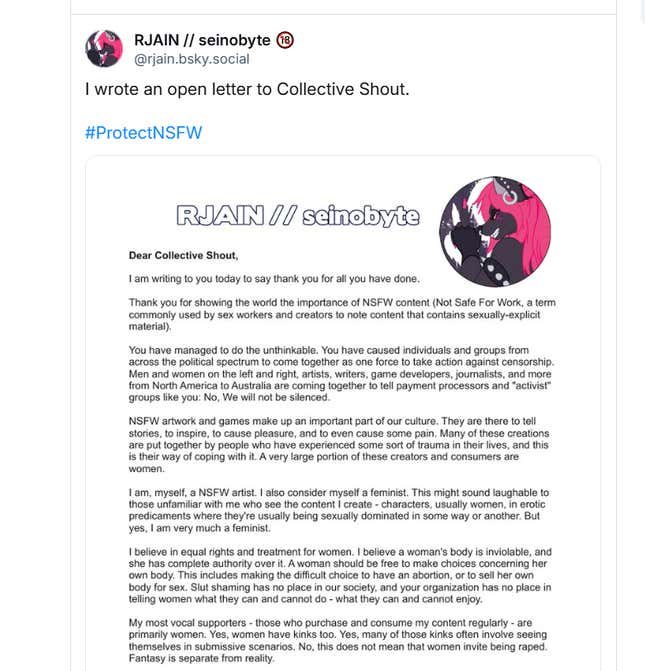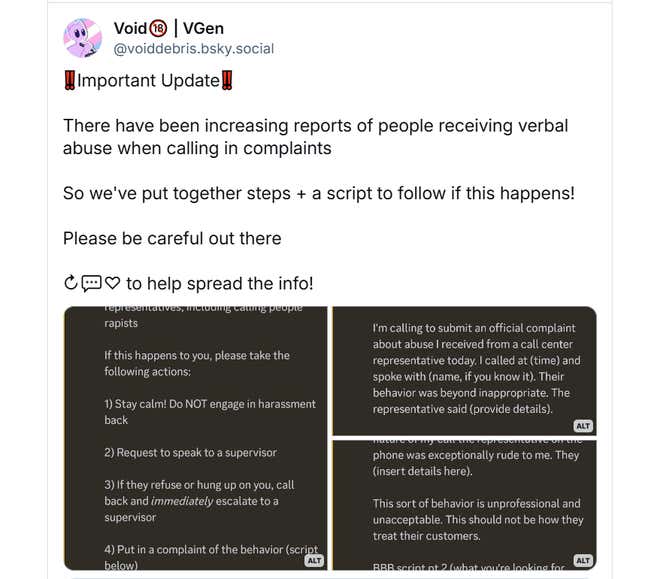Artist Gilbert Martinez had just poured himself a glass of water and was pacing his suburban home in San Antonio, Texas while trying to navigate Mastercard’s byzantine customer service hotline. He was calling to complain about recent reports that the company is pressuring online gaming storefronts like Steam and Itch.io to ban certain adult games. He estimates his first call lasted about 18 minutes and ended with him lodging a formal complaint in the wrong department.
Martinez called back two more times, assured in each case that his frustrations with Mastercard, whose payment system he uses through PayPal to buy games from Valve, were being recorded as part of his file in the company’s system. “The call rep said that the higher-ups are aware of the situation and they’re trying to find a solution for it,” he told Kotaku. “The call rep sounded courteous at best, though I imagine they’d probably have to be given that they’re still dealing with a costumer. I was polite as I can be the whole call.”
Martinez is part of a growing backlash to Steam and Itch.io purging thousands of games from their databases at the behest of payment processing companies. Australia-based anti-porn group Collective Shout claimed credit for the new wave of censorship after inciting a write-in campaign against Visa and Mastercard, which it accused of profiting off “rape, incest, and child sexual abuse game sales.” Some fans of gaming are now mounting reverse campaigns in the hopes of nudging Visa and Mastercard in the opposite directions.

“Seeing the rise of censorship and claiming it’s to ‘protect kids,’ it sounds almost like the Satanic Panic, targeting people that have done nothing to anyone except having fun,” Martinez told Kotaku. “We’re already seeing the negative effect this has on people’s personal and financial lives because of such unnecessary restrictions. If parents are so concerned over protecting kids, then they should parent their own kids instead of forcing other people to meet their ridiculous demands.”
Indie horror game Vile: Exhumed is one of the titles that’s been banned from Steam by Valve. Released last year by Cara Cadaver of Final Girl Games, it has players rummage through a fictional ‘90s computer terminal to uncover a twisted man’s toxic obsession with an adult horror film actress, using this format to engage with themes of online misogyny and toxic parasocial relationships. “It was banned for ‘sexual content with depictions of real people,’ which, if you have played it, you know is all implied, making this all feel even worse,” Cadaver wrote on Bluesky on July 28.
Valve did not immediately respond to a request for comment.
Vile: Exhumed is a textbook example of what critics of the sex game purge always feared: that guidelines aimed at clamping down on pornographic games believed to be encouraging or glorifying sexual violence would inevitably ensnare serious works of art grappling with difficult and uncomfortable subject matter in important ways. Who gets to decide which is which? For a long time, it appeared to be Steam and Itch.io. Last week’s purges revealed it’s actually Visa and Mastercard, and whoever can frighten them the most with bad publicity.
“Things are definitely changing as reports of responses to calls have gone from ‘Sorry what are you talking about?’ to then ‘Are you ALSO calling about itch/steam’ to now some [callers] receiving outright harassment,” a 2D artist who goes by Void and who has helped organize a Discord for a reverse call-in campaign told Kotaku. It’s hard to have any clear sense of the scope of these counter-initiatives or what ultimate impact they might have on the companies in question, but anecdotally the effort seems to be gaining traction. For instance, callers are now needing to spend less time explaining what Steam, Itch.io, or “NSFW” games are to the people on the other end of the line.
“For calls I was originally focusing on Mastercard, but I ended up getting a lot of time out of Visa,” Bluesky user RJAIN told Kotaku. “Two days ago I had a call with Visa that lasted over an hour, and a follow-up call later on that lasted over 2.5 hours. Those calls, I spoke with a supervisor and they seemed very calm and understanding. Yesterday, the calls were different. The reps seemed angry and exhausted. They refused to let me speak to a supervisor and kept insisting that it is now protocol for them to disconnect the call on anyone complaining about this issue.”
Bluesky user snowlupinwood, an LGBT furry author whose work was impacted on itch.io, said calls were juggled between various managers until one earlier this week led to a 30-minute exchange with a manager reading from a script, while subsequent calls led to quickly getting disconnected. Another person who claimed to call at least 30 times said the interactions have also changed since last week when the purges on itch.io and Steam first happened.

“Now, as soon as I mention anything in regards to the issue of censorship, they immediately tell me to email,” Bluesky user sakurakyun told Kotaku. “Even if I ask for a supervisor, some even hung up on me after pretending they were transferring me. Others started cutting me off and started their ‘ending speech’ informing me they can no longer help me and to email. Some even started mocking me and telling me that they recognize my number and they ask me before I said anything if I called before. I am very concerned with my next phone call but I will be continuing to call until they change something. I am not scared of being yelled at, I’ve been working in customer service for almost 5 years now.”
Visa and Mastercard did not immediately respond to requests for comment.
Some say the exchanges have remained polite while others say they’ve been put on hold indefinitely. “It’s clearly having an impact,” RJAIN said. “They are changing how they deal with calls and they sound exhausted with the issue. There are often queue times when I call.” The ACLU, which has been critical of credit card companies being leveraged to censor sex work online, also commented on the issue on Tuesday, though it hasn’t shared any direct actions it might be pursuing on behalf of effected creators.
Some industry trade groups have also weighed in. The International Game Developers Association (IGDA) released a statement stating that “censorship like this is materially harmful to game developers” and urging a dialogue between “platforms, payment processors, and industry leaders with developers and advocacy groups.” “We welcome collaboration and transparency,” it wrote. “This issue is not just about adult content. It is about developer rights, artistic freedom, and the sustainability of diverse creative work in games.”
For the time being, that dialogue appears to mostly be taking place at Visa’s and Mastercard’s call centers, at least when they allow it.
.



